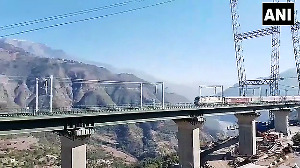Did the United States manipulate the violence in Urumqi, capital of China's western Xinjiang province? At least, officials in Beijing believe so.
According to an article in the China Daily, which was reproduced by the People's Daily, Washington could be furthering its geopolitical interests in the region by acting through its private non-governmental organisation, the National Endowment for Democracy.
The reasons for Washington's intervention into Xinjiang affairs seems to have little to do with concerns over alleged human rights abuses by Beijing authorities against Uighur people, the report said, adding that it seems to have very much to do with the strategic geopolitical location of Xinjiang on the Eurasian landmass and its strategic importance for China's future economic and energy cooperation with Russia, Kazakhstan and other Central Asian states of the Shanghai Cooperation Organisation.
Beijing also doubts the ties -- mostly financial -- that NED has with the Washington-based World Uyghur Congress. The newspaper report claimed that the NED was 'intimately involved in financial support to various organisations behind the Crimson Revolution in Tibet in March 2008, as well as the Saffron Revolution in Burma/Myanmar and virtually every regime change destabilisation in eastern Europe over the past years from Serbia to Georgia to Ukraine to Kyrgystan to Teheran in the aftermath of the recent elections.'
Read the article: Is Washington playing a deeper game with China?
About 20 million people, representing 47 ethnic groups, live in China's vast Xinjiang region. The largest group is the 8.3 million ethnic Uighurs -- an Islamic Central Asian people.
But the number of Han Chinese in the region has risen from six per cent in 1949 to more than 40 per cent now.
Critics say it is part of a policy of Han Chinese migration to dilute any nationalist tendencies.
According to the website of the World Uyghur Congress, the "trigger" for the riots was an alleged violent attack on June 26 in China's southern Guangdong Province at a toy factory where the WUC alleges that Han Chinese workers attacked and beat to death two Uighur workers for allegedly raping or sexually molesting two Han Chinese women workers in the factory.
However, official Chinese reports say that it was Uighur rioting and attacks on Han Chinese residents that resulted in deaths and destruction and that
Questioning the timing of the violence in Urumqi, the China Daily article pointed out that the past few years, in the face of what is seen as an increasingly hostile and incalculable United States foreign policy, the major nations of Eurasia -- China, Russia, Kazakhstan, Uzbekistan, Kyrgyzstan and Tajikistan have increasingly sought ways of direct and more effective cooperation in economic as well as security areas.
'That Eurasian cohesion from Russia to China across Central Asian countries is the geopolitical cohesion Washington most fears. While they would never say so, growing instability in Xinjiang would be an ideal way for Washington to weaken that growing cohesion of the Shanghai Cooperation Organization nations,' the article concluded.
Meanwhile, spelling out the United States' foreign policy initiatives for the immediate future, Secretary of State Hillary Clinton on Wednesday said, 'In approaching our foreign policy priorities, we have to deal with the urgent, the important, and the long-term all at once. But even as we are forced to multi-task -- a very gender-related term -- we must have priorities, which President Obama has outlined in speeches from Prague to Cairo, from Moscow to Accra.
'We want to reverse the spread of nuclear weapons, prevent their use, and build a world free of their threat. We want to isolate and defeat terrorists and counter violent extremists while reaching out to Muslims around the world. We want to encourage and facilitate the efforts of all parties to pursue and achieve a comprehensive peace in the Middle East. We want to seek global economic recovery and growth by strengthening our own economy, advancing a robust development agenda, expanding trade that is free and fair, and boosting investment that creates decent jobs.
'We want to combat climate change, increase energy security, and lay the foundation for a prosperous clean-energy future. We want to support and encourage democratic governments that protect the rights and deliver results for their people. And we intend to stand up for human rights everywhere,' Clinton said on the eve of her departure to India and Thailand.
Acknowledging that some would actively seek to undermine the efforts of the United States, Clinton warned such foes that 'our focus on diplomacy and development is not an alternative to our national security arsenal. Our willingness to talk is not a sign of weakness to be exploited. We will not hesitate to defend our friends, our interests, and above all, our people vigorously and when necessary with the world's strongest military. This is not an option we seek nor is it a threat; it is a promise to all Americans.'






 © 2025 Rediff.com -
© 2025 Rediff.com -